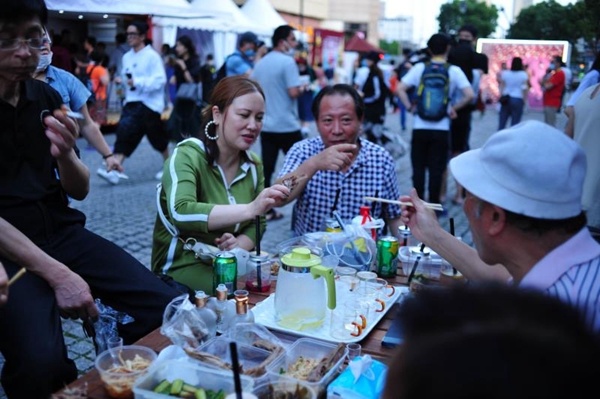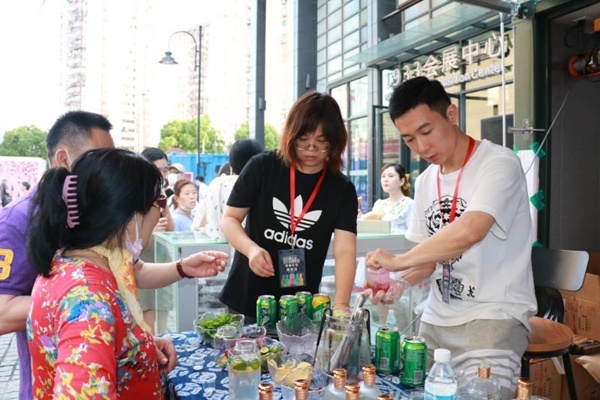
Visitors enjoy food and drinks at Wine Fair, a sub-event of the wine and spirits festival at 1933 Shanghai in Hongkou district. (Photos: China Daily)
Unlike previous editions, this year's Shanghai Wine & Spirits Festival does not have a confirmed end date.
Rather, apart from the main event that kicked off on June 6, the festival will also comprise multiple subevents that are scheduled to take place throughout the year.
"The biggest difference of this year's festival is that there are different topics and sub-events. We want this year's event to be 'never-ending'," says Xu Qin, director of the Hongkou district commission of commerce, one of the main organizers of the event.
"This festival is no longer just a wine activity for distributors and agents to interact. We want to share the wine and spirits culture with more people so that they will have a greater understanding of these products."
Organized by the Shanghai Municipal Commission of Commerce and the government of Hongkou district, the festival has attracted hundreds of enterprises from more than 50 countries since its launch in 2004.
Besides featuring famous liquor brands such as Wuliangye, Changyu and Cavesmaitre, the festival this year also invited a host of bartenders to prepare cocktails for guests. Also present were vendors selling snacks like kebabs, DJs and street performances.
The move to transform the festival appears to be driven by the growing interest that Chinese consumers have for wine and spirits.
According to an industry-research report by iiMedia Group, the sales of spirits in the nation from January to November 2019 was 492.74 billion yuan ($70.41 billion), a year-on-year growth rate of 19.9 percent.
Meanwhile, e-commerce sites sold 76.7 billion yuan worth of wine and spirits in 2018, up from just 7 billion in 2013. The report estimates that sales would exceed 100 billion yuan in 2020.

Visitors enjoy food and drinks at Wine Fair, a sub-event of the wine and spirits festival at 1933 Shanghai in Hongkou district.
Among the companies that have benefitted from this rise in interest is Chinese baijiu (white liquor) brand Qianzuiduo.
This year, the brand set up a 10-square-meter container space in which visitors could sample different types of cocktails made using the company's baijiu.
The tiny space managed to rake in 50,000 yuan in sales over two days, a two-fold increase from last year.
"The growing influence of the festival is the main reason behind our growth in sales. The festival has also become livelier because of the additional activities and this has certainly helped," says Deng Jianghao, CEO of Qianzuiduo.
"In the past, visitors usually hung around for three to five minutes before moving on to another booth. This time around, more people stayed longer to experience the atmosphere and our products."
Deng points out that it wasn't just sales at the festival that have improved.
"Our business wasn't affected by the COVID-19 epidemic. In fact, our sales have increased over the past several months compared with the same period of last year," he says.
Xu adds that digital platforms have also empowered the festival. He says merchants are not just resorting to offline communication to draw customers but livestreaming channels as well.


